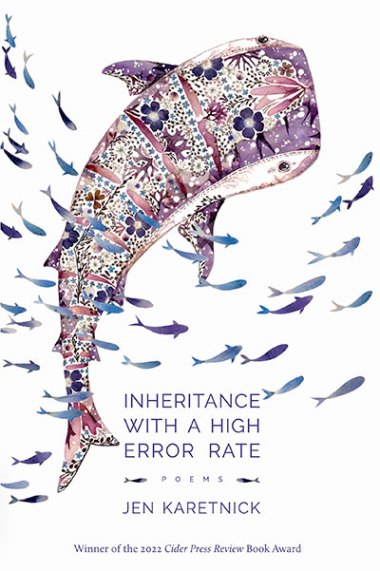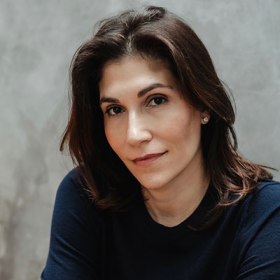Poems by Jen Karetnick’); return false;” title=”Printer Friendly, PDF & Email”>

Inheritance with a High Error Rate
By Jen Karetnick
Cider Press Review | 2024 | 94 pages
 Witty and wondrous, Jen Karetnick’s carefully sculpted fifth full-length poetry collection Inheritance with a High Error Rate, winner of the 2022 Cider Press Review Book Award, features the ever-changing landscapes of Florida. She evokes a menagerie of flora and fauna including whales, owls, ospreys, sargassum-filled seas, forests of gumbo limbo, fetterbush, bitterwood, and crowning her nature descriptions is the king of all fruits, the mango, or as Karetnick describes, “that ornament of dawn.” Utilizing free verse, traditional forms and forms of her own invention, her poems are as lustrous and carefully polished as the interior of a conch, inviting us to listen, to feel, to be saturated in the sensorial.
Witty and wondrous, Jen Karetnick’s carefully sculpted fifth full-length poetry collection Inheritance with a High Error Rate, winner of the 2022 Cider Press Review Book Award, features the ever-changing landscapes of Florida. She evokes a menagerie of flora and fauna including whales, owls, ospreys, sargassum-filled seas, forests of gumbo limbo, fetterbush, bitterwood, and crowning her nature descriptions is the king of all fruits, the mango, or as Karetnick describes, “that ornament of dawn.” Utilizing free verse, traditional forms and forms of her own invention, her poems are as lustrous and carefully polished as the interior of a conch, inviting us to listen, to feel, to be saturated in the sensorial.
Karetnicks’s hawk-eyed observations aren’t just keen environmental awareness; her poems are a call to action, to take note, to record, to share and amplify poetry as exemplified in the last stanzas of “In the Photic Zone”:
What we think we own
will no longer be ours to claim.
But the leaves of every book
we’ve ever read, libraries
of poems lingering in the water
like sonar, will green
and green and green and green.
Sometimes it’s daunting to read environmental literature because one is attuned to expect escapist fantasies or preachy brimstone, but Karetnick keeps it real with humor, tenderness, and authenticity; she anchors her hope in poetry. Working for more than 15 years as an educator and serving as a founding editor of SWWIM (Supporting Women Writers in Miami) since 2016, Karetnick actively engages in community-building in the literary world. Through her constant involvement and support of the arts, she spurs her ideas to transform and effect change. In “Flight Plan,” citing the Mary Oliver line “a poem should always have birds in it,” Karetnick responds with a poem about the act of catch and release that parallels motherhood with the collection of migrating songbirds for scientific banding: “… there can also be no grounding without joy in it. This is how I now see // that day: Each child in our arms. Each bird in its net. The horizon, filled / with its own swelling promise, also waiting for some kind of release.” Karetnick’s poems give wing to that joy.
Karetnick is also a food-travel-lifestyle journalist, author of four cookbooks, and perhaps that constant attention to detail is why her work is rooted in the sensorial. Never blustery or over-embellished, her descriptions are tight and carefully faceted, as exemplified in this selection of lines from various poems in the collection: “screech owls warn us with a bounce / of song”, “the ponds as dark / as immorality, where the wading / birds snap at whatever touches them”, “With every king tide the land loosens a little more / around me, a floral caftan to wear after surgery.” Her detailed observations, grounded by personal experiences, lead to a wider, universal perception that speaks of our modern world. Her poems convey an urgency; they insist on a reckoning:
when the water recedes like a hairline, leaving its prickly
evidence of once-was. This is how it is to long for something
I haven’t even left yet, steeped in nostalgia like old tea
leaves that have barely any hue and even less future to give,
Karetnick is recognized for her range of topics and inventive forms, and in this collection, in addition to sonnets, pantoums, duplexes, sestinas, and contrapuntals, what stands out is a form of her own creation, the “evaporating villanelle.” Not only does it strike gonging bells in tone and content, but visually, the shape of the poem represents the very thing she is warning us of: a disappearing peninsula, rising waters, an ever-tightening heat. In “Evaporating Villanelle for Emotion #2,” an ekphrastic response to the work of Walter Brown, a physician/pathologist and artist who builds installations of plastic bags filled with acrylic paint and backlit in plexiglass boxes, Karetnick, in turn, creates art in a form that erases and re-uses, which speaks to the idea of loss and survival:
Evaporating Villanelle for Emotion #2
After EMOTION #2 by Walter Brown
Grief arrives often into the middle
of things, interjected like a comma
that survives, woven into the saddle
of a list chosen by Oxford for battle,
twanging every axon in the soma.
Grief arrives often into the middle
and rarely softens,
demagoguery
that survives, woven
into the sodden
season, sharp-eyed, spry.
Grief arrives, sudden
serrated knives.
Fabric frayed
that survives—
defended;
amended.
Grief arrives.
That survives.
Divided into three sections, Inheritance with a High Error Rate establishes an arching narrative that mimics the Florida shoreline and the outline of the human body, both embraced by the ocean and struggling to find a balance in “the smallest hopes.” Karetnick understands we are only the caretakers of these bodies, and her voice never pontificates, but rather invites us to linger in the subtropical world, to consider the equilibrium of what remains and what has been lost, and to mirror our conscience in our actions. This is poetry for everyone—an engaging and multi-layered collection carried by a sincere voice.
Read poetry by Jen Karetnick appearing in Terrain.org: “Natural Selection” and the Letter to America poem “Mango: An Inheritance with a High Error Rate.”
 Alexandra Lytton Regalado is a Salvadoran-American author, editor, and translator. Her works include Relinquenda, winner of the National Poetry Series (Beacon Press, 2022), and Matria (Black Lawrence Press, 2017). She is co-founding editor of Kalina Press and assistant editor at SWWIM.
Alexandra Lytton Regalado is a Salvadoran-American author, editor, and translator. Her works include Relinquenda, winner of the National Poetry Series (Beacon Press, 2022), and Matria (Black Lawrence Press, 2017). She is co-founding editor of Kalina Press and assistant editor at SWWIM.
Header photo by IHarvepino, courtesy Shutterstock. Photo of Alexandra Lytton Regalado by Lucy Tomasino.
- SEO Powered Content & PR Distribution. Get Amplified Today.
- PlatoData.Network Vertical Generative Ai. Empower Yourself. Access Here.
- PlatoAiStream. Web3 Intelligence. Knowledge Amplified. Access Here.
- PlatoESG. Carbon, CleanTech, Energy, Environment, Solar, Waste Management. Access Here.
- PlatoHealth. Biotech and Clinical Trials Intelligence. Access Here.
- Source: https://www.terrain.org/2024/reviews-reads/inheritance-high-error-rate/
